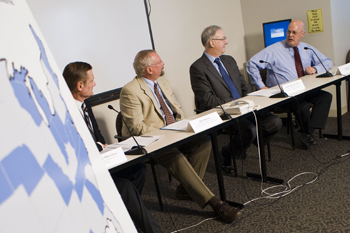 |
From left: Sen. Mike Gloor; Dale Hartwig, vice president of Grand Island’s St. Francis Medical Center; Ken Cowan, M.D., Ph.D., director of the UNMC Eppley Cancer Center; and cancer survivor Jim Eagle at a news conference to announce a new agreement regarding health insurance coverage of clinical trials. The agreement will allow most Nebraskans to know whether their insurance covers such studies. |
As part of an agreement announced at UNMC on Thursday, most Nebraskans now will know whether their insurance covers such trials.
State Sen. Mike Gloor of Grand Island and others worked with The Nebraska Insurance Federation on the agreement, which makes Nebraska one of 27 states with such an initiative. The NIF is composed of 27 major insurers.
“The goal is to be able to get treatment started right away and to have confidence in health insurance coverage for that treatment,” Gloor said.
Trials offer needed hope
Clinical trials are conducted in hospitals, clinics and private practice offices. The National Institutes of Health says that countless lives have been saved and improved thanks to clinical trials.
The federation agreement covers clinical trials that have been approved by:
- The National Institutes of Health;
- U.S. Food and Drug Administration;
- Department of Defense;
- Veteran’s Administration; and
- The National Cancer Institute.
Most clinical studies are approved by one of these organizations, said Ken Cowan, M.D., Ph.D., director of the UNMC Eppley Cancer Center
Participation the biggest barrier for trials
The biggest barrier to completing clinical trials is lack of participation, Dr. Cowan said, noting that less than 5 percent of adults with cancer take part in such studies.
At UNMC, there are 102 active phase II, III and IV studies underway to test investigational medications. Half of these studies involved cancer patients.
“I have cancer patients who had very little hope of survival, but because of their participation in a clinical trial, years were added to their lives,” Dr. Cowan said.
UNMC employee: Trial saved my life
John Eagle, manager of video network services in UNMC ITS Video Services, believes a clinical trial saved his life.
Eagle has been in remission for 12 years since his treatment for a form of non-Hodgkin’s lymphoma. He enrolled in a clinical trial that tested a new drug in combination with chemotherapy. The trial was key to his survival, he said.
But had his insurance company not paid for his clinical trial, he may not have participated.
“I would have asked how expensive the costs would have been and probably would have opted out of the study,” Eagle said.